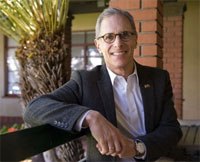Fox News bars gay candidate from Iowa debate

Fred Karger
Openly gay presidential candidate Fred Karger will once again be left out of a nationally televised debate among Republican presidential hopefuls—this time, in Iowa on Thursday night.
Karger says he meets the criteria Fox News set to participate in the debate this week and that he’ll continue to fight to be included in upcoming debates. But the Iowa Republican Party did invite Karger to participate in this Saturday’s straw poll ballot in Iowa, and Karger declined.
Why?
Money.
To participate in the August 13 straw poll, Karger said, his campaign would have to contribute $15,000 to the party, pay for parking spaces, put up an air-conditioned tent, and buy a slew of $30 tickets to give to supporters willing to attend the straw poll event and vote for him. With the student bodies at local colleges still away for the summer, said Karger, the crowd in Ames this weekend will be especially tilted away from the party’s more moderate candidates.
“I have to pick and choose my battles,” said Karger, in a phone interview Monday.
But Karger has waged a battle to be included in Thursday’s debate, the first presidential debate in Iowa among Republican candidates. It takes place at 9 p.m. EDT Thursday on the campus of Iowa State University in Ames. The deadline debate sponsors set for any candidate to qualify for inclusion: Tuesday at 5 p.m.
But those sponsors –Fox News, the Iowa Republican Party, and the Washington Examiner news organization—said last Friday that Karger failed to qualify.
The criteria, spelled out by Fox News, amounted to three things:
- that the candidate be registered with the Federal Elections Commission as a presidential candidate; Karger is.
- that the candidate meet all requirements for presidential qualification as spelled out by the U.S. Constitution. Karger does. And,
- that the candidate has earned an average of at least one percent in five national polls of “most recent polling.” This is where the dispute lies.
Karger points to these five national polls, all independent polls conducted this year involving Republicans or Republican-leaning Independents:
- a Harris Interactive poll, completed August 4, in which he garnered support from two percent of 1,168 people surveyed online;
- a Zogby poll, completed July 25, in which he garnered support from one percent of 1,103 people surveyed online;
- a McClatchy-Marist poll, completed June 23, in which he garnered support from less than one percent of 308 people surveyed by telephone. Karger was identified to them as “Political Activist Fred Karger” and, odd as it may sound, he earned a full one percent from Republicans identified as “Tea Party supporters.”
- a Zogby poll, completed May 23, in which he garnered support from one percent of 1,169 people surveyed online; and
- a Fox News poll, completed April 27, in which Karger garnered support from one percent of 911 people surveyed by telephone who identified themselves as registered voters.
Karger says the average of these five surveys gives him a clear one-point average.
Fox doesn’t dispute Karger’s math. It disputes which polls he uses to achieve it.
Michael Clemente, vice president for news at Fox, explained, through a spokesperson Monday, that “none” of the five polls Karger cited helped him meet the one percent threshold. The Harris poll and the two Zogby polls, he said, don’t qualify because they are online surveys. He did not respond to a question asking why online surveys are not accepted.
Both internet and phone surveys can have their biases, says Williams Institute scholar Gary Gates, an expert in survey data relating to LGBT people.
“Internet surveys can be biased by the fact that the demographic characteristics of internet users are likely different from those of the general population (e.g., younger, more education),” said Gates. “But phone surveys can also be biased, especially if they exclude cell phones.” And then there’s the issue that cell phone exchange numbers are no longer “geographically defined,” said Gates.
Polling firms, said Gates, attempt to correct potential sample biases through various “weighting” methods to ensure that a survey sample represents as accurately as possible the population.
“In general, our knowledge about how to appropriately weight a typical random-digit-dial phone survey is more advanced than our knowledge about weighting of internet-only surveys,” said Gates. But it’s a complicated process and “there’s no magic way to determine a priori whether a particular method [for weighting] is best.”
Clemente called the April poll by Fox “out of date.” In two subsequent Fox polls, Karger’s name did not reach one percent. And the McClatchy-Marist poll registered less than one percent for Karger.
But Karger says Fox’s criteria for inclusion “never specified” that the polls had to be conducted by telephone versus online and never defined what Fox considered “most recent.”
Karger said Tuesday he would file a complaint with the Federal Elections Commission over the dispute and his campaign website is asking supporters to sign a petition, urging Fox to include him in the debate.
One problem for Karger has been with polling groups themselves. Unlike Fox, which has included Karger’s name each time, most of the polls conducted by independent firms in the past month—including Pew, Gallup, CNN, ABC, and NBC—have not included Karger’s name on a list of candidates for respondents to choose from. That’s been a problem for a few other Republican candidates, too, including U.S. Rep. Thad McCotter of Michigan and former New Mexico Governor Gary Johnson.
But Karger said he thinks Fox decided to exclude him from this week’s debate because they’re concerned his more “centrist” positions “would be appealing to a broad range” of voters.
And Karger’s not giving up.
“I’m going to fight for every one” of the debates, said Karger, who expects there will be more than a dozen to come. “I’m going to fight like hell for every one.”

